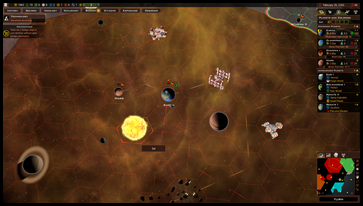
Sliders. Knobs. Checkboxes. Such is the spread-sheet roots of strategy games. Let's fix that.
Going back 15 years to Galactic Civilizations I for Windows, players managed their economy like this:

GalCiv I: Sliders.
In Galactic Civilizations I, you would set your tax rate. Your tax rate affected the approval rate on your planets. You could then decide how much of your GDP the government would take control of with the spending slider. From there, players would direct their civilization's output between Military, Social, and Research.

In Galactic Civilizations III, we had changed it to the Production Wheel: Manufacturing, Wealth Generation, Research.
I actually don't have a problem with sliders to be honest. But they have a serious user interface limitation: The more sliders you have, the more confusing the screen and the more difficult it is to communicate the results.
Let's talk about economics
Our economies are a lot more complicated than Money making, Research and Planet manufacturing and Fleet construction. Obvious real-world examples would include food production, consumer goods, social programs and international affairs. In a space game, there are even priorities you might have: Mining, espionage, soldiers, Precursor archeology, and so on. Imagine all that as sliders. Oye.

What are Galactic Citizens?
Across your entire civilization, an individual of great potential will rise up and join your government. When this happens you decide an area for he or she to specialize in.

A new citizen has joined you. What will you do with them?
Now, there are some...provisos here that will make each game play a bit differently.
-
How often you get a free citizen is not dependent on the size of your civilization. It is, by default, one citizen every 10 turns. So each citizen is pretty important. A 200 turn game will leave you with 20 natural citizens. Use them wisely.
-
The areas of specialization are based on what technology you have. At the start of the game, if you are playing as the Terran Alliance, your options are a Leader or a Commander.
-
You can choose to keep them safe in your capital providing a global bonus (great for large empires) or you can send them to a specific planet to really boost that planet's production in a given area (great for small empires) but also makes them vulnerable if they are assassinated or the planet is invaded (once they settle, they're not leaving).
-
They level up over time. Thus, the order in which you specialize them matters.

The govern screen with some citizens there. Leaders act as wild cards and can be placed in any category.

Citizens can also be sent to planets to greatly boost it in a specific area.

Citizens can't teleport. When sent to a planet, a VIP transport takes them from your capital world to the planet in question.

Worried about micro-management? Don't. We also include easy ways to move citizens from your capital to your empire if necessary.

Not just icons. Each citizen has a name and where they're from and a picture (and yea, we do this for all 12 races, Drengin females...you do not want to attend their march).
Citizen Specialties (so far)
| |
Specialization
|
Strategic Benefit
|
Tactical Benefit
|
Special
|
|

|
Leader
|
Provides 3% boost to target civilization priority.
|
Cannot leave the capital.
|
Can be moved around to any priority category.
|
|

|
Administrator
|
Reduces all colony maint by 3%
|
Reduces target planet’s maintenance by 25%.
|
Increases administration resource by 1 plus 10%.
|
|

|
General
|
Improves global planetary resistance by 3%.
|
Provides 5 legions to target planet for defense.
|
Can be converted into an invasion transport holding the General and his legions.
|
|

|
Commander
|
Improves global starship HP by 3%
|
Increases planetary defense of orbiting ships by 25%.
|
Can be converted to a Flag Ship that is added to a target fleet to give it a combat boost.
|
|

|
Spy
|
Improves global security by 3%
|
Can be sent to eliminate a spy on a planet.
|
Can be assigned missions targeting foreign powers.
|
|

|
Worker
|
Increases global manufacturing by 3%
|
Can settle on a planet to boost its manufacturing by 25%
|
|
|

|
Scientist
|
Increases global research by 3%
|
Can settle on a planet to boost its research by 25%
|
|
|

|
Farmer
|
Increase global food production by 3%
|
Can settle on a planet boosting its food production by 25%
|
|
|

|
Engineer
|
Increases global fleet production by 3%
|
Can settle on a planet boosting its fleet production by 25%
|
|
|

|
Entrepreneur
|
Increases global wealth production by 3%
|
Can settle on a planet boosting its wealth production by 25%
|
|
|

|
Celebrity
|
Provides a global 3% bonus to planetary goods and services.
|
Can settle on a planet providing a 25% boost to planetary goods and services.
|
|
|

|
Diplomat
|
Provides a global 3% boost to influence.
|
Can settle on a planet and boost that planet’s influence by 25%.
|
Can be converted into an Emissary and sent to a target civilization boosting your relations.
|
A living civilization

If you're a Galactic Civilizations player you might be thinking "This is going to require a lot of changes to existing balance." And you would be right. Take a very close look at the screenshot below.

Still early game and lots of new resources to play with
Look at the top of the previous screenshot. Notice how many resources there are? Your citizens are your principle lever for deciding what matters (and what doesn't) in your civilization. But how you will likely use your citizens will change from game to game because of the new resource system and their connection to what improvements you can build, what planets you can colonize, what your starbases can and can't do. Resources accumulate (unlike in GalCiv III) and they result in a vibrant galaxy for your citizens to play in.
Next week: Resources!